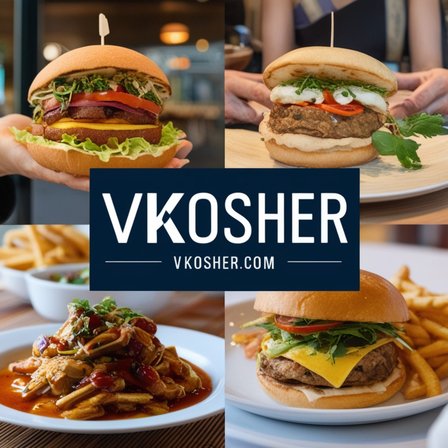The Rise of Kosher Street Food: Tradition Meets Innovation
Kosher street food, a phenomenon that has steadily gained traction over the past decade, is more than just a trend—it's a cultural movement that merges ancient dietary laws with the fast-paced world of modern culinary delights. As food trucks, markets, and festivals dedicated to kosher offerings spring up across major cities around the globe, this niche has become a staple for both Jewish communities and food enthusiasts alike. In this exploration of kosher street food, we delve into its origins, the appeal it holds today, and the future of this vibrant food culture.
A Brief History of Kosher Food
Kosher, derived from the Hebrew word "kashér," meaning fit or proper, refers to foods that comply with Jewish dietary laws, known as kashrut. These laws, rooted in the Torah, dictate what is permissible for consumption and how food must be prepared. The rules cover everything from the types of animals that can be eaten, to the way they are slaughtered, and the prohibition of mixing meat and dairy.
While kosher laws have been around for thousands of years, kosher street food is a relatively recent development. Traditionally, kosher food was associated with home-cooked meals, synagogue events, or specialized delis and restaurants. However, with the rise of street food culture in the early 21st century, there was a growing demand for convenient, quick, yet still kosher options. This demand has led to a flourishing market where tradition meets innovation.
The Appeal of Kosher Street Food
Kosher street food offers a unique appeal that goes beyond religious observance. For many, it's about trust and quality. The rigorous standards of kosher certification ensure that food is prepared with a high level of care, making it appealing even to those who do not observe Jewish dietary laws. In an age where consumers are increasingly concerned about food safety, the transparency of kosher practices is a significant draw.
Moreover, kosher street food represents a fusion of flavors and cultures. It’s not uncommon to find kosher tacos, sushi, or even burgers with a Middle Eastern twist at food markets. This fusion is a reflection of the diverse backgrounds of the Jewish diaspora, blending traditional Jewish dishes with influences from countries as varied as Mexico, Japan, and Ethiopia.
Kosher Street Food Around the World
In cities like New York, Los Angeles, London, and Tel Aviv, kosher street food has become an integral part of the culinary landscape. New York, with its large Jewish population, is perhaps the most prominent hub for kosher street food. From the bustling streets of Brooklyn to the food trucks in Midtown Manhattan, there's a wide variety of kosher street foods available, from classic pastrami sandwiches to more contemporary offerings like vegan falafel.
Los Angeles, another city with a significant Jewish community, boasts a vibrant kosher street food scene as well. Here, food trucks offer everything from kosher Korean barbecue to Mediterranean shawarma, showcasing the city's melting pot of cultures.
In London, kosher street food markets have become popular spots for both locals and tourists. The city’s diverse Jewish population, which includes Ashkenazi, Sephardic, and Mizrahi Jews, has influenced the variety of kosher street food available. From bagels and salt beef to Persian-style kabobs, London’s kosher street food scene offers something for everyone.
Tel Aviv, the heart of Israel, offers a different take on kosher street food. Here, the food is often more traditional, with a focus on Middle Eastern flavors. Hummus, falafel, and shawarma are staples, but with a modern twist. Food trucks and stands in Tel Aviv are known for their fresh ingredients and creative combinations, making it a haven for food lovers.
Challenges and Opportunities
Running a kosher street food business comes with its own set of challenges. The need for kosher certification, which can be costly and time-consuming, is one of the primary hurdles. Moreover, maintaining kosher standards in a mobile kitchen environment, such as a food truck, requires careful planning and execution.
However, these challenges also present opportunities. The kosher certification itself is a mark of quality and authenticity, which can attract a broader customer base. Additionally, the growing interest in dietary restrictions, such as gluten-free or vegan options, aligns well with kosher food, which often adheres to similar principles of purity and careful preparation.
For entrepreneurs in the kosher street food industry, there is also the opportunity to innovate. With the global street food trend continuing to rise, there is ample room to introduce new flavors and concepts that adhere to kosher standards. From kosher ramen to kosher Cuban sandwiches, the possibilities are endless.
The Future of Kosher Street Food
The future of kosher street food looks bright, driven by a combination of tradition and innovation. As more people become aware of the benefits of kosher food—whether for religious reasons, health concerns, or simply the pursuit of quality—this niche market is poised for continued growth.
Technology is also playing a role in the evolution of kosher street food. Apps that locate kosher food trucks, online ordering systems, and social media marketing are helping kosher street food vendors reach a wider audience. These tools not only make it easier for consumers to find kosher options but also allow vendors to innovate and expand their offerings.
Moreover, as the global demand for street food continues to rise, kosher street food is likely to become a fixture in major food festivals and events. This exposure will introduce kosher cuisine to new audiences, further expanding its reach and popularity.
Conclusion
Kosher street food is a dynamic and evolving culinary phenomenon that beautifully blends the old with the new. Rooted in ancient traditions, yet constantly innovating to meet the demands of modern consumers, it is a testament to the resilience and adaptability of Jewish cuisine. Whether you're in New York, Tel Aviv, or any other major city with a vibrant Jewish community, kosher street food offers a taste of history with a twist of modernity. As this trend continues to grow, it will undoubtedly play a significant role in shaping the future of street food around the world.




